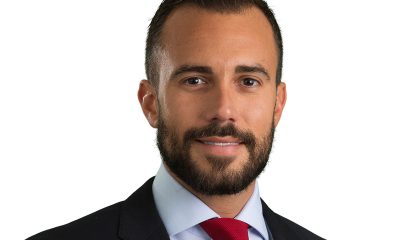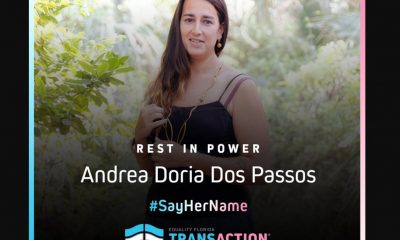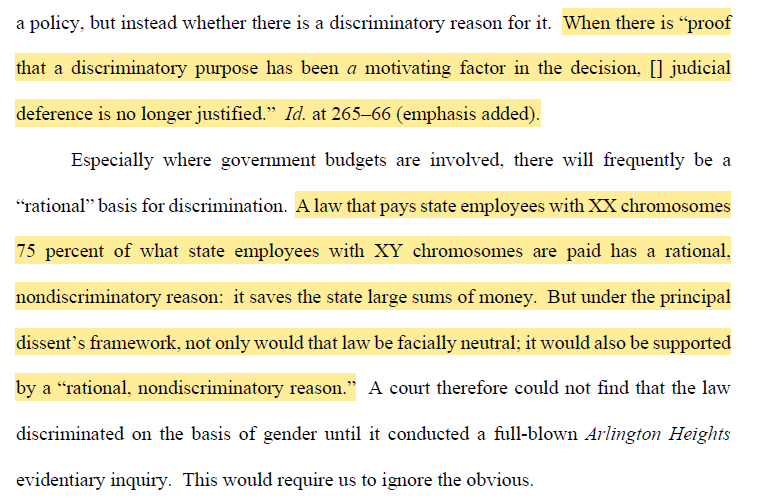National
Activists differ over calls to cut Uganda aid
Funding of government programs curtailed over anti-gay law
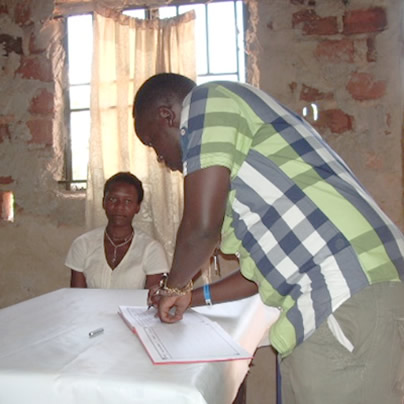
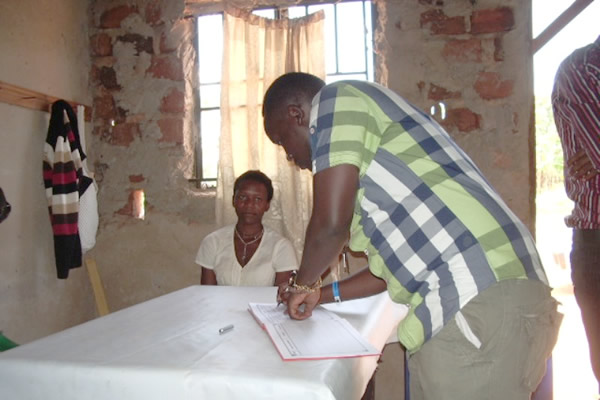
Dickson Mujuni of the RPL AIDS Foundation in Uganda working with youth
peer educators in the East African country. (Photo courtesy of Dickson
Mujuni)
LGBT rights advocates in Uganda and other countries continue to disagree over whether the East African nation should lose foreign aid over a law that imposes a life sentence upon anyone found guilty of repeated same-sex sexual acts.
BuzzFeed late on Sunday reported the Obama administration will divert $6.4 million originally earmarked for the Inter-Religious Council of Uganda – which backs the Anti-Homosexuality Act that Ugandan President Yoweri Museveni signed last month – to other organizations. The website also noted a study designed to identify groups at risk for HIV/AIDS the Centers for Disease Control and Prevention had planned to conduct with a Ugandan university has been suspended.
Jonathan Lalley, a spokesperson for the National Security Council, told BuzzFeed the Obama administration will also redirect roughly $3 million that had been earmarked to promote tourism and biodiversity to non-governmental organizations that work on the issue. The website further reported the Pentagon has suspended or cancelled “near-term invitational travel” for Ugandan officials and plans to relocate events that had been scheduled to take place in the East African country in the coming weeks and months.
Dickson Mujuni of the RPL AIDS Foundation told the Washington Blade on Monday the Inter-Religious Council of Uganda should not receive U.S. aid because he said HIV/AIDS programs the group funds “don’t consider” the “most at-risk populations.”
“Those leaders themselves have been promoting homophobia, putting pressure on the president to assent to the AHB (Anti-Homosexuality Bill) which he did and commending him for signing that bill into law,” he said.
Frank Mugisha, executive director of Sexual Minorities Uganda, a Ugandan LGBT advocacy group, offered a different perspective.
“I don’t support aid cuts in any form,” he told the Blade. “People should know that those are country policies which don’t comply with legislation such as the anti-gay law.”
A number of African advocates who traveled to New York last December to attend the 65th anniversary of the U.N. General Assembly’s ratification of the Universal Declaration of Human Rights told the Blade they oppose efforts to cut foreign aid to Uganda and other countries over their country’s LGBT rights records.
“We’re not asking the U.K. or foreign governments to cut aid to Africa,” said Juliet Mphande, executive director of Rainka Zambia, during a briefing the International Gay and Lesbian Human Rights Commission hosted. “LGBTI individuals are also Africans, so ultimately we all benefit from that aid.”
Ben Summerskill, who recently stepped down as chief executive of Stonewall U.K., last December applauded British Prime Minister David Cameron’s decision to directly channel foreign aid to non-governmental organizations in Uganda and other countries with controversial human rights records. Summerskill spoke to the Blade in New Hampshire hours after the Ugandan Parliament approved the Anti-Homosexuality Bill.
“I don’t think any LGBT campaigner, however strongly they feel about Uganda, would think that it was a good thing that people should starve just so we feel we’re making some progress around human rights for gay people,” said Summerskill.
The Obama administration last month announced after Museveni signed the Anti-Homosexuality Bill into law that it had begun a review of its relationship with Uganda.
A CDC-funded program that fully or partially funded the salaries of 87 employees of the Ugandan Ministry of Health who support the country’s HIV/AIDS response ended on Feb. 28. The World Bank, the Netherlands and other European countries have also cut aid or postponed loans to the East African country after Museveni signed the Anti-Homosexuality Bill.
Uganda receives nearly $300 million each year through the President’s Emergency Plan for AIDS Relief (PEPFAR) to fight the epidemic in the East African country. The Ugandan government in 2013 received more than $485 million in aid from the U.S.
The Washington Post on Sunday reported the White House will send 150 Air Force special operations personnel and several aircraft to Uganda to help the country’s government track down Joseph Kony, leader of the Lord’s Resistance Army whom the International Criminal Court has indicted for war crimes and crimes against humanity that stem from the group’s decades long insurgency against the Ugandan government. The Lord’s Resistance Army is among the issues that U.S. Sen. Jim Inhofe (R-Okla.) and four other members of Congress discussed with Museveni during a meeting on Jan. 23.
The delegation did not meet with Ugandan LGBT rights advocates while in the country, but Inhofe has repeatedly expressed his opposition to the Anti-Homosexuality Bill to the Blade.
“I certainly disagree with the controversial legislation that Uganda may enact in the coming days,” said the Oklahoma Republican before Museveni signed the measure into law. “It is my hope that the country will abandon this unjust and harsh legislation.”
Mugisha is among the Ugandan human rights advocates who signed onto a challenge of the Anti-Homosexuality Bill that the Civil Society Coalition on Human Rights and Constitutional Law filed with the country’s Constitutional Court earlier this month.
“We are cognizant that there are many who share our concerns about Ugandan President Museveni’s recent enactment of the Anti-Homosexuality Act,” said Grant Harris and Stephen Pomper of the National Security Council on Monday. “Ensuring justice and accountability for human rights violators like the LRA [Lord’s Resistance Army] and protecting LGBT rights aren’t mutually exclusive. We can and must do both.”
National
United Methodist Church removes 40-year ban on gay clergy
Delegates also voted for other LGBTQ-inclusive measures
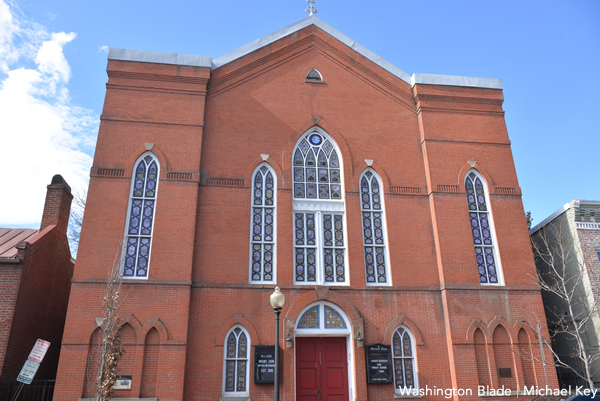
The United Methodist Church on Wednesday removed a ban on gay clergy that was in place for more than 40 years, voting to also allow LGBTQ weddings and end prohibitions on the use of United Methodist funds to “promote acceptance of homosexuality.”
Overturning the policy forbidding the church from ordaining “self-avowed practicing homosexuals” effectively formalized a practice that had caused an estimated quarter of U.S. congregations to leave the church.
The New York Times notes additional votes “affirming L.G.B.T.Q. inclusion in the church are expected before the meeting adjourns on Friday.” Wednesday’s measures were passed overwhelmingly and without debate. Delegates met in Charlotte, N.C.
According to the church’s General Council on Finance and Administration, there were 5,424,175 members in the U.S. in 2022 with an estimated global membership approaching 10 million.
The Times notes that other matters of business last week included a “regionalization” plan, which gave autonomy to different regions such that they can establish their own rules on matters including issues of sexuality — about which international factions are likelier to have more conservative views.
Federal Government
Republican state AGs challenge Biden administration’s revised Title IX policies
New rules protect LGBTQ students from discrimination

Four Republicans state attorneys general have sued the Biden-Harris administration over the U.S. Department of Education’s new Title IX policies that were finalized April 19 and carry anti-discrimination protections for LGBTQ students in public schools.
The lawsuit filed on Tuesday, which is led by the attorneys general of Kentucky and Tennessee, follows a pair of legal challenges from nine Republican states on Monday — all contesting the administration’s interpretation that sex-based discrimination under the statute also covers that which is based on the victim’s sexual orientation or gender identity.
The administration also rolled back Trump-era rules governing how schools must respond to allegations of sexual harassment and sexual assault, which were widely perceived as biased in favor of the interests of those who are accused.
“The U.S. Department of Education has no authority to let boys into girls’ locker rooms,” Tennessee Attorney General Jonathan Skrmetti said in a statement. “In the decades since its adoption, Title IX has been universally understood to protect the privacy and safety of women in private spaces like locker rooms and bathrooms.”
“Florida is suing the Biden administration over its unlawful Title IX changes,” Florida Gov. Ron DeSantis wrote on social media. “Biden is abusing his constitutional authority to push an ideological agenda that harms women and girls and conflicts with the truth.”
After announcing the finalization of the department’s new rules, Education Secretary Miguel Cardona told reporters, “These regulations make it crystal clear that everyone can access schools that are safe, welcoming and that respect their rights.”
The new rule does not provide guidance on whether schools must allow transgender students to play on sports teams corresponding with their gender identity to comply with Title IX, a question that is addressed in a separate rule proposed by the agency in April.
LGBTQ and civil rights advocacy groups praised the changes. Lambda Legal issued a statement arguing the new rule “protects LGBTQ+ students from discrimination and other abuse,” adding that it “appropriately underscores that Title IX’s civil rights protections clearly cover LGBTQ+ students, as well as survivors and pregnant and parenting students across race and gender identity.”
Federal Government
4th Circuit rules gender identity is a protected characteristic
Ruling a response to N.C., W.Va. legal challenges
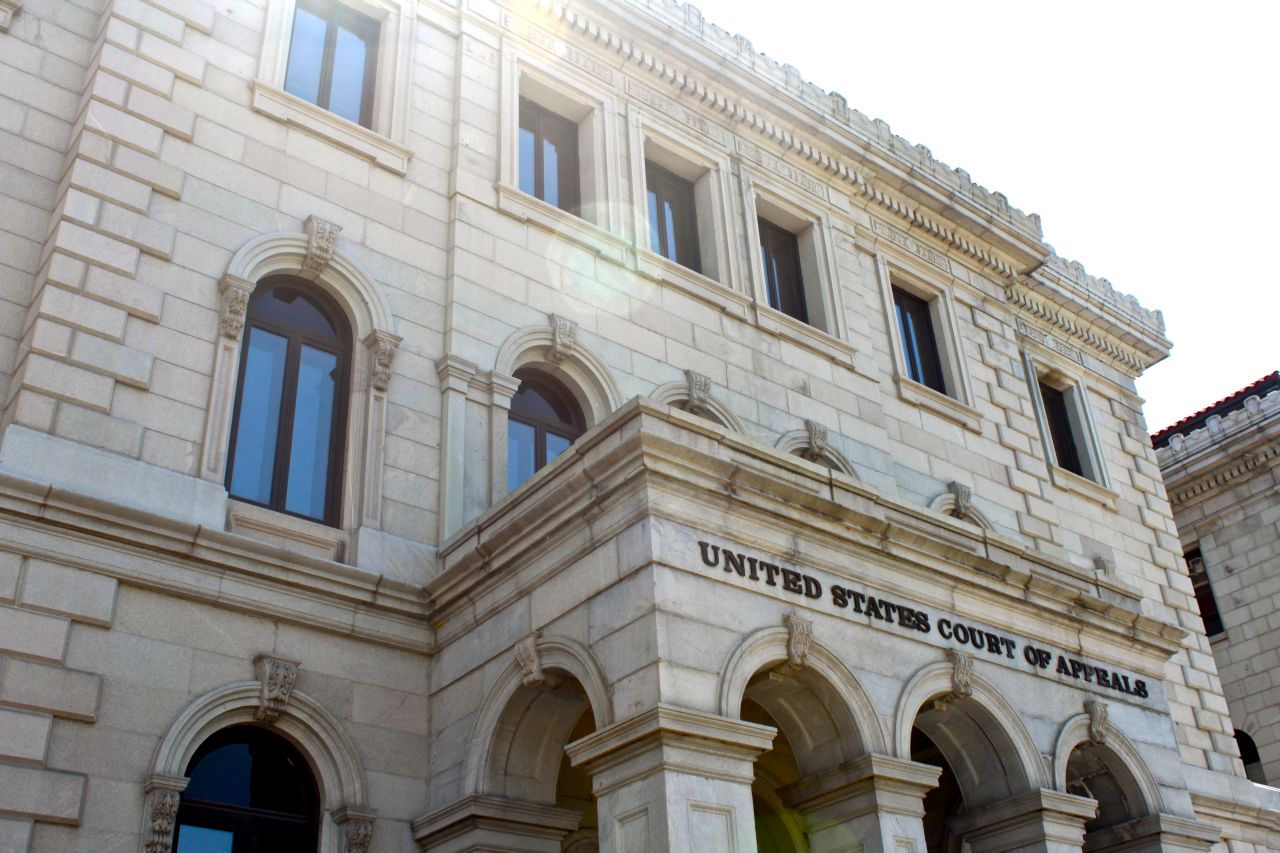
BY ERIN REED | The 4th U.S. Circuit Court of Appeals ruled Monday that transgender people are a protected class and that Medicaid bans on trans care are unconstitutional.
Furthermore, the court ruled that discriminating based on a diagnosis of gender dysphoria is discrimination based on gender identity and sex. The ruling is in response to lower court challenges against state laws and policies in North Carolina and West Virginia that prevent trans people on state plans or Medicaid from obtaining coverage for gender-affirming care; those lower courts found such exclusions unconstitutional.
In issuing the final ruling, the 4th Circuit declared that trans exclusions were “obviously discriminatory” and were “in violation of the equal protection clause” of the Constitution, upholding lower court rulings that barred the discriminatory exclusions.
The 4th Circuit ruling focused on two cases in states within its jurisdiction: North Carolina and West Virginia. In North Carolina, trans state employees who rely on the State Health Plan were unable to use it to obtain gender-affirming care for gender dysphoria diagnoses.
In West Virginia, a similar exclusion applied to those on the state’s Medicaid plan for surgeries related to a diagnosis of gender dysphoria. Both exclusions were overturned by lower courts, and both states appealed to the 4th Circuit.
Attorneys for the states had argued that the policies were not discriminatory because the exclusions for gender affirming care “apply to everyone, not just transgender people.” The majority of the court, however, struck down such a claim, pointing to several other cases where such arguments break down, such as same-sex marriage bans “applying to straight, gay, lesbian, and bisexual people equally,” even though straight people would be entirely unaffected by such bans.
Other cases cited included literacy tests, a tax on wearing kippot for Jewish people, and interracial marriage in Loving v. Virginia.
See this portion of the court analysis here:
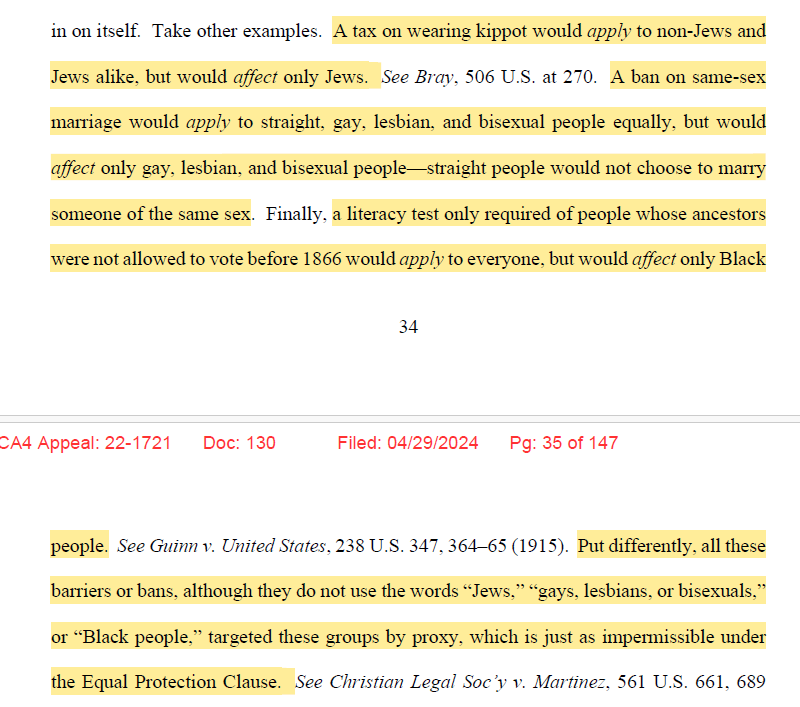
Of particular note in the majority opinion was a section on Geduldig v. Aiello that seemed laser-targeted toward an eventual U.S. Supreme Court decision on discriminatory policies targeting trans people. Geduldig v. Aiello, a 1974 ruling, determined that pregnancy discrimination is not inherently sex discrimination because it does not “classify on sex,” but rather, on pregnancy status.
Using similar arguments, the states claimed that gender affirming care exclusions did not classify or discriminate based on trans status or sex, but rather, on a diagnosis of gender dysphoria and treatments to alleviate that dysphoria.
The majority was unconvinced, ruling, “gender dysphoria is so intimately related to transgender status as to be virtually indistinguishable from it. The excluded treatments aim at addressing incongruity between sex assigned at birth and gender identity, the very heart of transgender status.” In doing so, the majority cited several cases, many from after Geduldig was decided.
Notably, Geduldig was cited in both the 6th and 11th Circuit decisions upholding gender affirming care bans in a handful of states.
The court also pointed to the potentially ridiculous conclusions that strict readings of what counts as proxy discrimination could lead to, such as if legislators attempted to use “XX chromosomes” and “XY chromosomes” to get around sex discrimination policies:
Importantly, the court also rebutted recent arguments that Bostock applies only to “limited Title VII claims involving employers who fired” LGBTQ employees, and not to Title IX, which the Affordable Care Act’s anti-discrimination mandate references. The majority stated that this is not the case, and that there is “nothing in Bostock to suggest the holding was that narrow.”
Ultimately, the court ruled that the exclusions on trans care violate the Equal Protection Clause of the Constitution. The court also ruled that the West Virginia Medicaid Program violates the Medicaid Act and the anti-discrimination provisions of the Affordable Care Act.
Additionally, the court upheld the dismissal of anti-trans expert testimony for lacking relevant expertise. West Virginia and North Carolina must end trans care exclusions in line with earlier district court decisions.
The decision will likely have nationwide impacts on court cases in other districts. The case had become a major battleground for trans rights, with dozens of states filing amicus briefs in favor or against the protection of the equal process rights of trans people. Twenty-one Republican states filed an amicus brief in favor of denying trans people anti-discrimination protections in healthcare, and 17 Democratic states joined an amicus brief in support of the healthcare rights of trans individuals.
Many Republican states are defending anti-trans laws that discriminate against trans people by banning or limiting gender-affirming care. These laws could come under threat if the legal rationale used in this decision is adopted by other circuits. In the 4th Circuit’s jurisdiction, West Virginia and North Carolina already have gender-affirming care bans for trans youth in place, and South Carolina may consider a similar bill this week.
The decision could potentially be used as precedent to challenge all of those laws in the near future and to deter South Carolina’s bill from passing into law.
The decision is the latest in a web of legal battles concerning trans people. Earlier this month, the 4th Circuit also reversed a sports ban in West Virginia, ruling that Title IX protects trans student athletes. However, the Supreme Court recently narrowed a victory for trans healthcare from the 9th U.S. Circuit Court of Appeals and allowed Idaho to continue enforcing its ban on gender-affirming care for everyone except the two plaintiffs in the case.
Importantly, that decision was not about the constitutionality of gender-affirming care, but the limits of temporary injunctions in the early stages of a constitutional challenge to discriminatory state laws. It is likely that the Supreme Court will ultimately hear cases on this topic in the near future.
Celebrating the victory, Lambda Legal Counsel and Health Care Strategist Omar Gonzalez-Pagan said in a posted statement, “The court’s decision sends a clear message that gender-affirming care is critical medical care for transgender people and that denying it is harmful and unlawful … We hope this decision makes it clear to policy makers across the country that health care decisions belong to patients, their families, and their doctors, not to politicians.”
****************************************************************************

Erin Reed is a transgender woman (she/her pronouns) and researcher who tracks anti-LGBTQ+ legislation around the world and helps people become better advocates for their queer family, friends, colleagues, and community. Reed also is a social media consultant and public speaker.
******************************************************************************************
The preceding article was first published at Erin In The Morning and is republished with permission.

